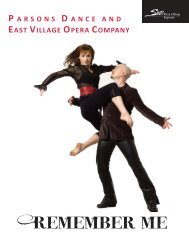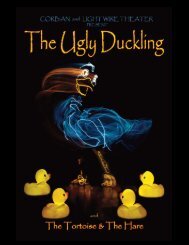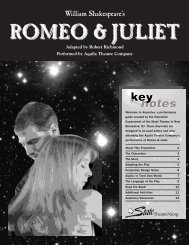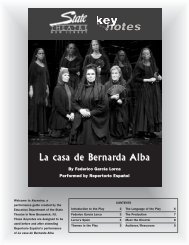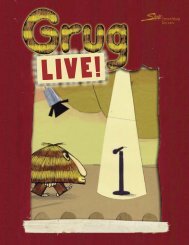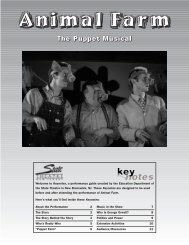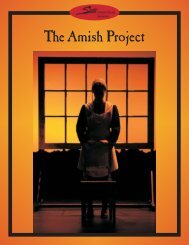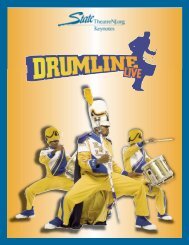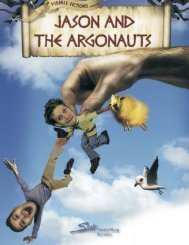Jekyll & Hyde.qxd - State Theatre
Jekyll & Hyde.qxd - State Theatre
Jekyll & Hyde.qxd - State Theatre
Create successful ePaper yourself
Turn your PDF publications into a flip-book with our unique Google optimized e-Paper software.
The Strange Case ofDr. . <strong>Jekyll</strong> & Mr. . <strong>Hyde</strong>Adapted from the novel by Robert Louis Stevensonwith new material by Louis ButelliPerformed by Aquila <strong>Theatre</strong> CompanyD I R E C T O R ’’ S N O T E B O O KA scrapbook of journal entries, clippings,illustrations, quotes, and other materials thatprovides a stage director with ideas forproducing a play. The notebook can includematerial about:• plot, characters, symbols, and other ideasabout interpreting the play• ideas for sets, costumes, lighting, and sounddesign• ideas to be shared with the playwright,actors, designers, and audience• problems that need to be solved duringrehearsals
S Y N O P S I SThe Strange Case of Dr. <strong>Jekyll</strong> & Mr. <strong>Hyde</strong>by Robert Louis StevensonMr. Utterson is a lawyer in Victorian London. He isconcerned about his friend, Dr. <strong>Jekyll</strong>, who has given up hismedical practice, withdrawn from his friends, and hiddenhimself away in his laboratory to work on some mysteriousexperiments. Utterson is especially upset that <strong>Jekyll</strong> haswritten a will leaving all his money to his sinister new friend,Mr. <strong>Hyde</strong>. The lawyer has heard disturbing stories about <strong>Hyde</strong>and disliked him even more after meeting him. He suspectsthat Dr. <strong>Jekyll</strong> is being blackmailed by Mr. <strong>Hyde</strong>.One day, Utterson is asked to identify the body of amurdered man. The victim turns out to be Sir Danvers Carew,one of Utterson’s clients. <strong>Hyde</strong> is suspected of committing themurder. When questioned, <strong>Jekyll</strong> says that he has not seen<strong>Hyde</strong> and has broken off their friendship. With Mr. <strong>Hyde</strong> gone,<strong>Jekyll</strong> becomes much more sociable and friendly.Several months later, though, <strong>Jekyll</strong> suddenly changes again.He locks himself in his laboratory and, in a strange voice,shouts at his servants through the door that they must obtaincertain chemicals for him. Convinced that their master hasbeen murdered and that another man has taken his place in thelaboratory, the servants call Utterson, who breaks down thedoor. There on the floor lies <strong>Hyde</strong>, dead by suicide. Uttersonassumes that <strong>Hyde</strong> has killed <strong>Jekyll</strong>, but the doctor’s body isnowhere to be found.Instead, Utterson finds a letter from Dr. <strong>Jekyll</strong> that solvesthe mystery. In the letter, <strong>Jekyll</strong> explains that as a young manhe did some shameful things that he struggled to keep secretfrom his friends. He began to conduct experiments to find away to separate the good and evil sides of the humanpersonality. He eventually created a formula that released hisevil side, Mr. <strong>Hyde</strong>.For a while <strong>Jekyll</strong> enjoyed his two separate bodies; since<strong>Hyde</strong> did not look like <strong>Jekyll</strong>, he could do whatever he likedwithout fear of discovery. After <strong>Hyde</strong> murdered Carew,however, <strong>Jekyll</strong> resolved never to take the potion again.Unfortunately, <strong>Hyde</strong> was now so strong that he could takecontrol even without <strong>Jekyll</strong> swallowing the formula. Indeed,<strong>Jekyll</strong> had to drink more of the potion to be rid of him, if onlytemporarily. When <strong>Jekyll</strong> ran out of one of the chemicals in hisformula, he knew that the only way to prevent <strong>Hyde</strong> fromreturning was to kill himself.T H ES T A R T I N GP O I N TAquila <strong>Theatre</strong> ADAPT - to changeCompany is known something so that it willwork in a differentfor adapting classicsituation or environmentplays and novels sothat modern audiences can clearly seeconnections to people and issues that areimportant to us today. They used Robert LouisStevenson’s 1886 book, The Strange Case ofDr. <strong>Jekyll</strong> & Mr. <strong>Hyde</strong> as a starting point. Readon to find out what other characters, events,and ideas they introduced into the play.Do you think it’s okay for playwrights tomake significant changes to an author’swork when adapting a novel into a playor film? What kinds of changes do you thinkwould be absolutely necessary to make thisstory work as a stage drama?Reign of Great Britain’s Queen Victoria(1837-1901). A period characterized by:• Great industrial expansion and scientificdiscovery• Deep social and moral contradictions. Onthe surface, a strong emphasis on moralityand restraint; in reality prostitution, childlabor, and exploitation of the poor areallowed to flourish.Some descriptions of <strong>Hyde</strong> from the book:• “Mr. <strong>Hyde</strong> was pale and dwarfish, hegave an impression of deformity withoutany nameable malformation...”(narrator)• “There is something wrong with hisappearance; something displeasing,something downright detestable. I neversaw a man I so disliked, and yet Iscarce know why.” (Enfield)• “O my poor old Harry <strong>Jekyll</strong>, if ever Iread Satan’s signature upon a face, itis on that of your new friend.” (Utterson)2
From the Desk of: Louis ButelliBrian—I’m really excited that I’ve been given the job of adapting TheStrange Case of Dr. <strong>Jekyll</strong> & Mr. <strong>Hyde</strong> into a script for Aquila<strong>Theatre</strong>. (I hope you’re just as excited that you’ll be directing theplay I’m creating!) I’ve been doing some research. Did you knowthat Robert Louis Stevenson’s book had already been adaptedfor the stage by a playwright named T. Russell Sullivan? Thisversion played in London in 1888. From what I’ve read, theshow was as famous and popular in its time as a blockbustermovie would be today.I also discovered that the actor who played <strong>Jekyll</strong> and <strong>Hyde</strong>was an American named Richard Mansfield. He was afascinating character in his own right. What do you think aboutthe idea of making Mansfield and his company our “partners”in creating the story, and structuring our piece as a play-within-aplay?We could show Mansfield’s company rehearsing andperforming their version of <strong>Jekyll</strong> and <strong>Hyde</strong>, and tell thebackstage story, too.Hope you like my ideas.—LouisHow SullivanAdapted Stevenson’sStory for the Stage:• Changed the timeframeso we see events asthey happen, ratherthan hear about themin the past tense.• Added a love interestfor Henry <strong>Jekyll</strong>: AgnesCarew, daughter of SirDanvers Carew.• Created some scenesshowing the “normal”side of <strong>Jekyll</strong>’s life: hisrelationship with Agnesand his social circle.R I C H A R DScottish author Robert Louis Stevenson (1850-1894), known for horror stories such as Dr. <strong>Jekyll</strong>& Mr. <strong>Hyde</strong> and The Body Snatcher, and adventurestories such as Treasure Island and Kidnapped.Stevenson wrote to Sullivan thathe did not mind the changes thatwere made to his story in the stageversion of <strong>Jekyll</strong> and <strong>Hyde</strong>. “I shouldhave been driven to make more: Ishould have had <strong>Jekyll</strong> married.”Helps the audience feelmore involved in thestory.Gives the murder of SirDanvers a lot moresignificance!Fleshing out <strong>Jekyll</strong>’spersonal life makes usfeel more connected tohim and more concernedabout his riskyexperiment.M A N S F I E L DHere’s a picture of Richard Mansfield as Dr.<strong>Jekyll</strong> and Mr. <strong>Hyde</strong>. There were reports ofladies fainting in their seats when he made hisfirst entrance as the evil <strong>Hyde</strong>. His portrayal wasso disturbing that he was actually considered asuspect in the Jack the Ripper murders.Several investigative articles were written in anattempt to expose Mansfield’s amazingtransformation as a technical gimmick. Inreality, the actor used only a change in posture,facial expression, and tone of voice, and thehelp of some special lighting.Mansfield was famousfor several Shakespeareanroles. Here he is asRichard III.Maybe in our play wecan have him quotesome Shakespeare.<strong>Jekyll</strong> and <strong>Hyde</strong> Dramatized: The1887 Richard Mansfield Scriptand the Evolution of the Storyon Stage, edited by by AlexanderChisholm and Martin A. Danahay.McFarland & Company, 2004.3
J A C KT H ER I P P E R !! !! !!Brian Parsons, DirectorLouis—I did a little reading about RichardMansfield’s London production of“J&H.” There are some intriguingcoincidences:— The stage manager of the theaterwhere Mansfield was performing theplay was none other than BramStoker, author of “Dracula.” Iwonder if his own novel wasinspired by the idea oftransformation in <strong>Jekyll</strong> & <strong>Hyde</strong>?— During the run of the play, theinfamous serial killer Jack theRipper was making headlines inLondon for the grisly murdersof at least five prostitutes.Let’s talk about working these characters andevents into our play.—BrianPossible characters forour play? How could wework them into the story?Bram Stoker - At the time he wasstage managing Dr. <strong>Jekyll</strong>, he wouldhave been about about 40 years old.B A C K G R O U N DJack the Ripper“Jack the Ripper” is the nickname given to a serial killerwho brutally murdered at least five women in a poor, crimeriddendistrict of London called Whitechapel in the secondhalf of 1888. The name “Ripper” refers to the killer’sgruesome ‘signature,’ which was to cut his victims’throats and then mutilate their bodies. The victims,women who worked as prostitutes, were typicallykilled in a public place.The Ripper was never caught, and his true identityhas not been determined to this day. This unsolvedmystery has inspired authors, historians, andamateur sleuths—known as “Ripperologists”—topresent a variety of colorful theories about who mighthave committed the murders. Some of the peopleaccused of being Jack the Ripper have includedthe actor Richard Mansfield and Prince AlbertVictor (known as “Prince Eddy”), who wassecond in line to the British throne.The number and names of the Ripper’s victims are thesubject of much debate. Some lists contain as many as 18suspected victims. Most agree on the following five women, allknown or suspected prostitutes.•Mary Ann (“Polly”) Nichols, killed on Friday, August 31, 1888•Annie Chapman, “Dark Annie,” killed on Saturday, September8, 1888•Elizabeth Stride, “Long Liz,” killed on Sunday, September 30,1888•Catherine Eddowes, killed on Sunday, September 30, 1888•Mary Jane Kelly, known as “Ginger,” killed on Friday, November9, 1888.The murder investigations were conducted by the LondonMetropolitan Police (popularly known as “Scotland Yard”).Among the investigators were Chief Inspector FrederickGeorge Abberline and Divisional Inspector John Spratling.During the Ripper murders, the police and newspapersreceived thousands of letters, some from people offering adviceabout catching the killer. Even more interesting were hundredsof letters that claimed to have been written by the killerhimself. Most of these letters are considered hoaxes. Thoughno one was ever arrested for the murders, the killingseventually ceased; no one really knows why.4
Brian—The script I’m creating goes back and forth betweenthe onstage performances of Dr. <strong>Jekyll</strong> & Mr. <strong>Hyde</strong> andthe backstage story of Richard Mansfield. You and theactors will need to come up with some creative ideas forstaging the play so that the audience can follow both ofthe plot threads without getting lost.—LouisP L O T # 1Dr. <strong>Jekyll</strong> & Mr. <strong>Hyde</strong>1. A party at the house of Sir Danvers Carew. Hisdaughter Agnes worries that her fiancé, Henry <strong>Jekyll</strong>,is working too hard. Dr. Lanyon tells lawyer Uttersonabout a little girl who was beaten up by an evil-lookingman named Edward <strong>Hyde</strong>. Utterson reveals that <strong>Jekyll</strong>has made <strong>Hyde</strong> the beneficiary of his will.2. <strong>Jekyll</strong> arrives and argues with Utterson over the will.3. Alone with Agnes, <strong>Jekyll</strong> tells her that he has gottenhimself into an impossible situation. She promises tostand by him no matter what happens. <strong>Jekyll</strong> leaves.4. <strong>Hyde</strong> appears. He tells Sir Danvers that he wantsAgnes and nothing can stop him from having her. SirDanvers attacks <strong>Hyde</strong> and is brutally murdered.5. Later, outside the door to <strong>Jekyll</strong>’s laboratory, Uttersonconfronts <strong>Hyde</strong>. He realizes that it was <strong>Hyde</strong> whomurdered Sir Danvers.6. Lanyon goes to <strong>Jekyll</strong>’s house to discuss the murder.He gets angry when <strong>Jekyll</strong> starts talking about hisexperiments for separating man’s good and evilnatures.7. Agnes tells <strong>Jekyll</strong> that she saw <strong>Hyde</strong> kill her father.<strong>Jekyll</strong> promises to meet her later at the police station.8. <strong>Jekyll</strong> has sent a note asking Lanyon to bring him somechemicals. When Lanyon arrives, he instead finds Mr.<strong>Hyde</strong>. As Lanyon looks on, <strong>Hyde</strong> mixes the chemicals,swallows, them, and is transformed into Dr. <strong>Jekyll</strong>.9. Some time later, <strong>Jekyll</strong> again awaits Lanyon. This time,Lanyon could not obtain the chemicals needed toprevent <strong>Jekyll</strong> from changing into Mr. <strong>Hyde</strong>. Realizingwhat he must do to be rid of <strong>Hyde</strong> once and for all,<strong>Jekyll</strong> sends Lanyon away and then kills himself byswallowing poison.A P L A YMansfield was famous forstepping out of character inthe middle of the performanceand speaking to the audience.Can you imagine an actor doingthat today?In VictorianLondon,opium denswere kind oflike the“crackhouses” thatplague ustoday.In the sceneswherethey’reperformingthe play, let’stry to showtheexaggeratedacting stylethatMansfieldand hiscompanywould haveused.W I T H I NA P L A YPLOT #2Behind the Scenes1. During rehearsals of the play, The Strange Case of Dr.<strong>Jekyll</strong> & Mr. <strong>Hyde</strong>, the star, Richard Mansfield, struggleswith nerves. The situation is not helped by Mr. Willis, hisambitious understudy, who is performing the role ofUtterson. The playwright, Russell Sullivan, tries toreassure Mansfield. The stage manager, Bram Stoker,gives Mansfield a packet containing some sort of drug.2. Opening night. Mansfield’s performance departssomewhat from the script, but is well received by theaudience. The actor makes a curtain speech.3. At the cast party, the company reads the newspaperreviews. Stoker notices an article—a report about aprostitute who was brutally murdered the night before.Mansfield meets a friend of Willis named Kate Eddowes.4. In his dressing room, Mansfield recalls his childhood,which he spent traveling with his mother, a famous operasinger. Kate reappears and decides to spend the eveningwith Mansfield instead of Willis.5. Mansfield takes Kate to an opium den in a dangerouslookingneighborhood called Whitechapel.6. At the theater the following night, Mansfield is unwell.During the performance, two inspectors from ScotlandYard—Abberline and Spratling—appear backstage to followup on a letter accusing Mansfield of being Jack the Ripper.7. The next day, Sullivan announces that Prince Albert Victor(“Prince Eddy”) will be attending this evening’s performance.8. In his dressing room, Mansfield finds a blackmail notethreatening to expose him as Jack the Ripper. Frightened,he leaves the theater in the middle of the performance.When Spratling and Abberline discover that their suspecthas disappeared, Sullivan suggests they look for him inWhitechapel.10. While Mansfield hallucinates in an opium den, Abberlineand Spratling go undercover on the streets of Whitechapel.They do not find Mansfield. Meanwhile, at the theater, theplay proceeds with Willis taking over as <strong>Jekyll</strong>/<strong>Hyde</strong>.11. Back at the opium den, Kate tries to get Mansfield toreturn to the theater for the command performance.12. At the theater, Abberline tells Sullivan that Mansfield is tobe arrested as the Ripper based on circumstantialevidence. Spratling brings news of yet another murder.13. Kate arrives and provides an alibi for Mansfield, who hassomehow managed to sneak back into the theater andresume his performance. Kate reveals that after his bigtransformation scene, Mansfield plans to announce to theaudience that Prince Eddy is Jack the Ripper. Abberline istold that that he must prevent this from happening.14. Mansfield does make a speech, though not the oneeveryone was expecting. He plays the final scene to its end.5
T H EW O R L DO FT H EP L A YTo the cast—There are two themes I’d like us to explore in ourrehearsals:— The duality of personality: how good and evil canexist in the same person. This is a particularlyinteresting theme in the context of Victoriantimes, when it was acceptable for people to haveall kinds of secret vices as long as they kept up arespectable appearance in public.— Addiction. Robert Louis Stevenson was thoughtto have been an alcoholic. Some people see Dr.<strong>Jekyll</strong> & Mr. <strong>Hyde</strong> as an allegory for the wayalcohol and drugs can completely TRANSFORMus into someone else. (As actors, transformationis our business!)How can we express these ideas physically as well aswith the text?—BrianHOMEWORKTo help us get into the minds ofthe characters, let’s do a grouprole-play exercise. We’ll start bycreating a script for a radiocall-in show. One ofus will play the host,and the rest of us willplay the characters inour story: <strong>Jekyll</strong>/ <strong>Hyde</strong>,Utterson, Agnes, Lanyon,and also Mansfield, Kate,Sullivan, Abberline, etc. Eachcharacter calls into the show with asituation or problem that they wantsome advice about. (For example,Lanyon might ask how to approachan old friend who has been actingoddly for the past year or so.) Theradio host then responds. Let’sperform our script in front of anaudience to see how well we reallyunderstand our characters.6In the late 18th and early 19thcenturies the use of OPIUM as arecreational drug was epidemic at alllevels of British society. Many over-thecounterremedies, including thosegiven to infants and children,contained this highly addictiveOf course Charles Darwin was one ofthe most influential scientific mindsin Britain during the Victorian Age.What other scientific discoveriesand inventions were happening? Canwe see any influences of all thisscientific activity in <strong>Jekyll</strong> & <strong>Hyde</strong>?HOMEWORKCheck out some of these books by British authors that dealwith themes similar to those found in <strong>Jekyll</strong> & <strong>Hyde</strong>:Frankenstein (1818), by Mary Shelley. Another story aboutwhat can happen when a scientist tries to play god.The Invisible Man (1897), by H.G.Wells. Yet another scientistwho experiments on himself with disastrous results. This timeit’s an invisibility formula.The Picture of Dorian Gray (1890), by Oscar Wilde. In thisstory, the lead character’s evil side is represented by a painting.Confessions of an English Opium-Eater (1822), by ThomasDe Quincey. An autobiographical account of opium addiction.The word “Victorian” hascome to mean having a highlyexaggerated standard of whatis moral or proper; but inreality, the Victorian periodwas a time when prostitution,drug abuse, and mistreatmentof the poor flourished. Howwould living in that kind ofsociety create someonelike Henry <strong>Jekyll</strong> oreven Jack the Ripper?
H O M E W O R KDear <strong>Jekyll</strong> & <strong>Hyde</strong> Company—I don’t think any of us realized how much Dr.<strong>Jekyll</strong> & Mr. <strong>Hyde</strong> has become a part of ourpopular culture. Once I started looking, Icouldn’t believe how many different versionsthere are of the story. Besides Sullivan’s play,there are dozens of other stage productions,musicals, movies, ballets, comic books, cartoons,and even toys and games! I’ve listed a few of themore popular ones here for us to look at as westart working on our own production. Keepan eye out for any interesting ideas youfind for sets, costumes, lighting, makeup,music, or interpretation.—LouisFor discussion: Does <strong>Jekyll</strong> & <strong>Hyde</strong>play on our fear of losing ourself-control.... or on our fantasiesabout what it would be like tobe totally uninhibited?The website http://casebook.org/press_reports offerstranscriptions of contemporary articles about the Whitechapelmurders from newspapers around the world. They give aninteresting perspective on the events as they unfolded.1920 :JohnBarrymore ina silentversion ofDr. <strong>Jekyll</strong> &Mr. <strong>Hyde</strong>1931:FredericMarch’sapelike <strong>Hyde</strong>menacesMiriamHopkins.1941:Spencer Tracyused aminimum ofmakeup tobecome <strong>Hyde</strong>.He was stillpretty scary.1963:The originalThe NuttyProfessor,with JerryLewis as anerdy versionof Dr. <strong>Jekyll</strong>.J&H ON FILM7Let’s imagine that we are newspaper reporters in London in1886. We’ve been assigned to report on the eventsdescribed in Dr. <strong>Jekyll</strong> and Mr.<strong>Hyde</strong>. The first article shouldbreak the news about thefirst appearance of Mr. <strong>Hyde</strong>and the last should detail theclimactic events at the end of thestory. To paint a vivid image for ourreaders, we should include detailsfrom the play and/or novel, as wellas quotes from characters whowould have been witnesses to theevents we’re describing. Let’s tryto write our stories in thejournalistic style they used in thelate 1800s.Like the scientists in Mary Shelley’s Frankensteinand H.G. Wells’ The Invisible Man, Henry <strong>Jekyll</strong>pushes far beyond the boundaries of scientificknowledge of his time. What drives people to explorethe unknown? Why do scientists take great risks anduse time, energy, and money to do and learn newthings?Did Dr. <strong>Jekyll</strong> go too far? What criteria would you useto determine what “too far” means? This is an issuethat’s certainly getting a lot of attention today.Let’s discuss some recent scientific advances (suchas cloning, genetic manipulation, growing new organsfor human use, artificial intelligence, cryogenics, andthe colonization of outer space) and decide whetherwe think any of them goes “too far.”
T H EP R O D U C T I O ND E S I G NTo the design team—Some things to consider as we’re creating the sets,costumes, lighting, and soundscape for our play:— In our play, we’re simultaneously showing theperformance of Dr. <strong>Jekyll</strong> & Mr. <strong>Hyde</strong> as well as thebackstage story. The production design should help makeclear to the audience the difference between “onstage”and “backstage.”— At the time our play takes place, the London theaterswere very ornate and lavishly decorated. This was in greatcontrast to the filth and poverty outside. I’d like ourdesign to reflect this contradiction between wealth andpoverty that was so much a part of the Victorian era.— Since this production will be touring by truck and planeto theaters across the U.S., keep in mind that the setsneed to be compact and light enough to pack up andtravel easily. Your design will also have to be flexibleenough to work in theaters of all different sizes—from 600seats to 2,000 seats.—BrianThe set design should include somebasic pieces that can be used inmany different ways during the play.They need to be light and easy tomove so the scene changes can bemade quickly and smoothly.Mr. <strong>Hyde</strong>, as he’sabout to transformhimself back into Dr.<strong>Jekyll</strong>. Let’s see if ouraudience can tellwhat theatrical“tricks” we used toshow not only the<strong>Jekyll</strong> & <strong>Hyde</strong>performance, but whathappens backstage, too.Here’s Willis, stepping in for Mansfield toplay Dr. <strong>Jekyll</strong> in the playwithin-theplay. His bodylanguage gives a good ideaof the acting style of theperiod. Note the Victorianeraneckwear.AQUILA PRODUCTION TEAMDirectorBrian ParsonsProducerPeter MeineckComposer/Musical Director Anthony CochraneProduction Design Meineck & RichmondLighting DesignPeter MeineckAssociate ProducerTodd BatstoneTechnical DirectorRobert ColonCostumierMegan BowersH O M E W O R KBased on the story,characters, andsetting of our play andthe ideas we’vechosen toemphasize, what kind ofmusic should we askTony, our composer tocreate? Can we findsome existing music thatwould give him an idea ofwhat we’re after? Looking at thestory, what kinds of sound effectsmight we need him to design?8
T OO U RDear <strong>Jekyll</strong> & <strong>Hyde</strong> Audience—The theater was a different place back in 1888.Audiences had a different set of expectations andfollowed different rules of behavior thanthose we use today. By our standards,Victorian audiences were downrightrude! They went to the theater tocheer (or boo at!) the acting skills oftheir favorite performers, responding inwhatever way an actor moved them. Theaudience would not only applaud linesthat they enjoyed, but would shoutcomments to the actors onstage.Of course, in this day and agethat kind of behavior wouldget someone thrown out of a theater!During a live performance, we areexpected to stay in our seats and focus allour attention on the stage. Talkingduring the play—either to the peopleonstage or the people around us—isdefinitely out offashion. And weneed to remember afew rules that Victorianaudiences never had to consider, liketurning off our cell phones and putting away ourcameras during the show.All of us at Aquila <strong>Theatre</strong> Company hope you enjoyour production of The Strange Case of Dr. <strong>Jekyll</strong> & Mr.<strong>Hyde</strong>. See you at the <strong>State</strong> <strong>Theatre</strong>!Your friend,A U D I E N C E .. .. ..N O P H O T O G R A P H Y !!Louis Butelli, Associate Artist inResidenceAquila <strong>Theatre</strong> CompanyP H O N E O F F !!R E S O U R C E SFor FurtherExplorationBOOKS:The Complete History of Jackthe Ripper, by Philip Sugden. Carroll &Graff, 1995Life In Victorian England (The Way People Live), byDuane Damon. Lucent Books, 2005Stage Makeup, by Richard Corson and JamesGlavan. Allyn & Bacon, 2000WEBSITES:Aquila <strong>Theatre</strong> Companywww.aquilatheatre.comJack the Ripperwww.casebook.orgRichard Mansfield: Postcards of the actor in someof his famous roleshttp://shakespeare.emory.edu/actordisplay.cfm?actorid=38The Robert Louis Stevenson Web Sitehttp://dinamico.unibg.it/rls/rls.htmlRobert Louis Stevenson online exhibitwww.sc.edu/library/spcoll/britlit/rls/rls.htmlKeynotes are produced by the EducationDepartment of the <strong>State</strong> <strong>Theatre</strong>, NewBrunswick, NJ.Wesley Brustad, PresidentLian Farrer, Vice President for EducationKeynotes written and designed by Lian FarrerContributing editor: Lisa Beth Vettoso© 2006 <strong>State</strong> <strong>Theatre</strong>The Strange Case of Dr. <strong>Jekyll</strong> & Mr. <strong>Hyde</strong> production photos ©2005Richard Termine for Aquila <strong>Theatre</strong> CompanyThe <strong>State</strong> <strong>Theatre</strong>’s education program is funded in part by Bristol-Myers Squibb,Brother International Corporation, James and Diane Burke, the E & G Foundation,Johnson & Johnson, the J. Seward Johnson Foundation, the Robert Wood JohnsonFoundation, the Karma Foundation, the John F. Kennedy Center for the PerformingArts, the Blanche and Irving Laurie Foundation, the McCrane Foundation, theNational Starch and Chemical Foundation, the PNC Foundation, and the WachoviaFoundation. Their support is gratefully acknowledged.Funding has been made possiblein part by the NewJersey <strong>State</strong> Council on theArts/ Department of <strong>State</strong>, apartner agency of the NationalEndowment for the Arts.Continental Airlines is theofficial airline of the <strong>State</strong><strong>Theatre</strong>.The engagement of Aquila<strong>Theatre</strong> Company is a MidAtlantic Arts Foundationtour, funded by theFoundation in partnershipwith the NationalEndowment for the ArtsRegional Touring Program.9




